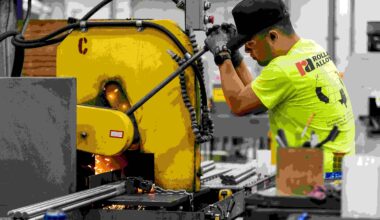Interested in requirements for a work permit in canada? This post will show you all the requirements and how to go about it.
Canada stands out as one of the most welcoming destinations for international workers seeking growth, stability, and global exposure.
The country’s thriving economy, high quality living standards, and fair labor policies make it a magnet for skilled individuals from around the world.
But, before you can officially join the Canadian workforce, understanding the requirements for a work permit in Canada is your first and most crucial step.
A work permit is a legal authorization issued by Immigration, Refugees and Citizenship Canada (IRCC) that allows foreign nationals to work in certain industries across the country.
It’s not just a piece of paper, it’s your key to entering Canada’s professional landscape and experiencing a system that values hard work, merit, and multicultural inclusivity.
If you’re a software developer heading to Toronto, a healthcare worker relocating to Alberta, or a construction expert joining projects in British Columbia, a work permit ensures your employment is recognized and protected under Canadian law.
This permit also serves as a foundation for future immigration pathways, including permanent residency.
The process may seem complex at first glance, but with the right information, applying becomes straightforward.
In this comprehensive guide, we will explain everything you need to know, from eligibility and documentation to the actual steps involved in applying and what happens after you arrive.
By the end, you will understand the requirements for a work permit in Canada and also gain the confidence to start your Canadian career journey right.
Understanding the Canadian Work Permit System
Canada’s work permit system is built to balance opportunity with regulation.
It ensures employers can hire international talent while protecting local labor standards.
There are two main types of work permits specific for employer and they are closed and open work permits.
An employer-specific work permit restricts you to one employer, one job position, and one location.
This type usually requires a Labour Market Impact Assessment (LMIA), and a document proving that hiring a foreign worker will not negatively affect Canada’s job market.
For instance, a tech company in Vancouver must demonstrate that no qualified Canadian was available before hiring an international applicant.
An open work permit, on the other hand, offers flexibility.
It allows you to work for any employer in Canada, except those banned for non-compliance.
This permit is often granted under programs like the Post-Graduation Work Permit (PGWP) or Spousal Open Work Permit.
And they are popular among international students and family dependents.
Understanding which type of permit suits your goal is crucial.
If your dream is to gain Canadian experience and later apply for permanent residency, starting with an employer-specific permit may be ideal.
But if you prefer job flexibility, an open permit could work better.
The requirements for a work permit in Canada are closely tied to these categories.
Applicants must meet conditions that prove they are legitimate, skilled, and ready to contribute positively to the economy.
The IRCC oversees the entire system, ensuring transparency, fairness, and compliance.
If you apply from within Canada or abroad, your application goes through strict verification to confirm your eligibility and purpose of stay.
Eligibility Criteria for a Canadian Work Permit
Before submitting your application, you must satisfy several important criteria that define the requirements for a work permit in Canada.
Below are the key eligibility factors every applicant should prepare for.
1. Proof of a Valid Job Offer
You need a legitimate offer from a recognized Canadian employer.
The offer letter should clearly state your job title, salary, work hours, and duration of employment.
In most cases, the employer must first obtain a positive LMIA to validate your hiring.
2. Proof of Identity
A valid passport or travel document is mandatory. The passport must remain valid for the duration of your intended stay in Canada.
It serves as both identification and verification of your nationality.
3. Proof of Financial Capacity
You must show that you have enough funds to support yourself and any dependents during your stay.
Bank statements, payslips, or sponsorship letters are often required.
4. Clean Criminal Record
Canada places a high value on security and integrity.
A police clearance certificate from your country of residence demonstrates your good conduct.
Applicants with criminal histories may face denial unless they qualify for rehabilitation.
5. Medical Examination
If you plan to work in healthcare, childcare, or agriculture, a medical exam conducted by an IRCC-approved panel physician is necessary.
This ensures you meet Canada’s public health standards.
6. Intent to Leave After Expiry
While many use work permits as a stepping stone toward permanent residency, you must initially prove that you intend to leave Canada once your permit expires, unless you apply for an extension.
7. Supporting Documents
This includes educational credentials, reference letters, and any certifications relevant to your field.
Meeting these conditions fulfills the baseline requirements for a work permit in Canada,
It demonstrate that you are a genuine, skilled, and responsible worker ready to contribute meaningfully to the country’s economy.
Step-by-Step Process of Applying for a Work Permit
Understanding the exact process is vital to avoid delays or rejection.
Here’s a breakdown of how to apply effectively while meeting all requirements for a work permit in Canada:
Secure a Job Offer
Start by finding a Canadian employer willing to hire you.
Use trusted job portals such as Job Bank, Indeed Canada, or LinkedIn. Ensure the job offer is genuine to avoid scams.
Employer Applies for LMIA (if applicable)
Most employers need to obtain an LMIA from Employment and Social Development Canada (ESDC).
This document proves that hiring you won’t negatively affect Canadian workers.
Gather Your Supporting Documents
Collect essential items such as your passport, employment letter, educational certificates, financial proofs, and police certificates.
These will support your application’s authenticity.
Complete the Online Application
Visit the official IRCC website to create an account and fill out the necessary forms.
Choose between applying from outside Canada, inside Canada, or at a port of entry (only if eligible).
Pay the Application Fees
The standard fee for a work permit application ranges from CAD $155 to $255 depending on the type.
Make sure your payment receipt is uploaded to your IRCC portal.
Provide Biometrics
Most applicants will need to visit a Visa Application Centre (VAC) in their country to submit fingerprints and photographs.
Attend Medical Examination (if required)
You’ll be instructed to visit an IRCC approved medical center for health screening.
Wait for Processing and Decision
Processing time varies from a few weeks to several months based on your country and the volume of applications.
Receive Your Port of Entry (POE) Letter
If approved, you’ll receive a POE letter which you present to an immigration officer upon arrival.
Following these steps carefully ensures you meet every part of the requirements for a work permit in Canada, improving your chances of approval.
Additional Requirements for International Applicants
While the core process remains the same for all, international applicants often have specific additional requirements for a work permit in Canada.
They depend on their nationality, travel history, and intended occupation.
• Country-Specific Documentation
Some applicants may be asked for additional proofs such as travel history, previous visa records, or detailed employment references.
This helps IRCC assess your credibility.
• Verified Job Offer
Given the rise in fraudulent offers, international applicants must verify that their Canadian employer has a legitimate business license and LMIA approval.
• Proof of Education and Experience
Applicants in specialized roles like engineering or nursing may need credential assessments through organizations such as WES to validate foreign degrees.
WES means World Education Services.
• Biometrics and Interview Attendance
International workers must complete biometric registration at a Visa Application Centre (VAC).
In some cases, interviews may be scheduled to confirm authenticity and job relevance.
• Proof of Language Proficiency
Though not mandatory for all permits.
Demonstrating proficiency in English or French through tests like IELTS or TEF can strengthen your application, especially for skilled positions.
• Family-Related Documentation
If you’re traveling with dependents, include marriage or birth certificates to link your family unit legally to your application.
• Medical Exam Certificates
Applicants from regions with higher health risks are required to complete medical screenings from IRCC approved clinics before approval.
• Visa Office Instructions
Each country’s Canadian visa office may have extra instructions such as passport submission or form updates.
Always review the IRCC country specific guide before submission.
By fulfilling these tailored requirements, international applicants enhance their credibility.
And also align with the comprehensive requirements for a work permit in Canada, reducing delays and rejections.
What to Expect Upon Arrival in Canada After Approval
Once your application is approved, it’s time to prepare for your new life in Canada.
Here is what typically happens upon arrival and how to remain compliant with all requirements for a work permit in Canada.
1. Port of Entry (POE) Inspection
At your first Canadian airport, immigration officers will review your POE letter, passport, and job offer.
They will then issue your actual work permit document, which outlines your job details and validity period.
2. Social Insurance Number (SIN)
You must apply for a SIN immediately after arrival.
It allows you to legally work and access government benefits. You can apply at any Service Canada office.
3. Health Insurance Registration
Depending on the province, you may need to wait a few months before being eligible for public health insurance.
Some employers provide temporary private coverage.
4. Understanding Your Rights and Responsibilities
Familiarize yourself with labor laws like wage rates, working hours, and workplace safety standards.
Canada emphasizes equality, meaning you have the right to fair treatment regardless of nationality.
5. Work Permit Renewal or Extension
Keep track of your permit’s expiry date.
You can apply for an extension if you wish to stay longer, provided your employer supports it or you qualify for another category.
6. Transitioning to Permanent Residency
After gaining work experience, you may qualify for pathways like Express Entry or the Provincial Nominee Program (PNP).
Many foreign workers use this route to settle permanently.
7. Settlement Support Services
Take advantage of free newcomer services offering job search help, language training, and community integration.
Meeting these post-arrival expectations ensures you remain fully compliant with the requirements for a work permit in Canada,
It will help you to set the foundation for a rewarding life abroad.
Conclusion
The journey to obtaining a Canadian work permit is not just about paperwork.
It’s a pathway to global exposure, professional growth, and personal transformation.
Understanding the requirements for a work permit in Canada means more than just meeting legal obligations.
It’s about aligning yourself with Canada’s values of integrity, hard work, and inclusivity.
From securing a verified job offer and providing clean records to completing biometrics and medicals, every step is designed to ensure fairness and protect both workers and employers.
Each document and proof you submit tells your story and your readiness to contribute to a thriving and diverse society.
For international applicants, Canada remains a land of immense opportunity.
The nation’s openness to foreign talent and its structured immigration system make it easier for skilled individuals to turn dreams into reality.
If your goal is to earn globally competitive wages, gain world-class experience, or eventually obtain permanent residency, everything begins with fulfilling the requirements for a work permit in Canada.
The work permit isn’t just permission to work, it’s your invitation to grow, learn, and succeed in one of the most stable economies in the world.
So, take each requirement seriously, prepare thoroughly, and let your journey to Canada become a story of resilience, ambition, and success.
Similar Post
Best Countries That Offer Study and Work Abroad Programs
Best Ireland Scholarships International Students Can Apply For






